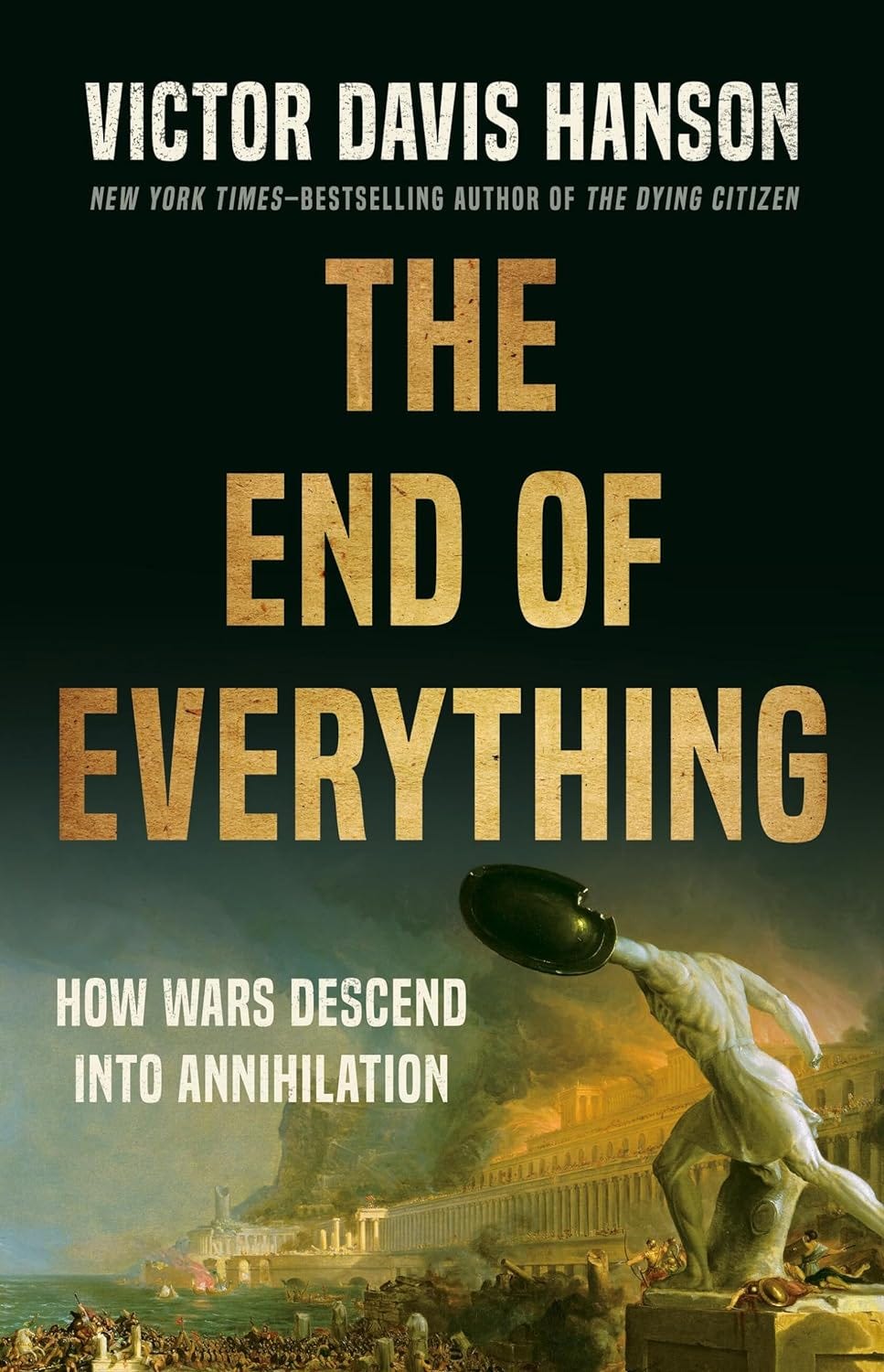Victor Davis Hanson on “The End of Everything”
Plus, Yossi Klein Halevi on antisemitism as the symbolization of The Jew
“How civilizations disappear” is the subject of Victor Davis Hanson’s latest book, “The End of Everything: How Wars Descend into Annihilation.”
Hanson is a senior fellow at the Hoover Institution and a professor emeritus of classics at California State University, Fresno. His new book offers four detailed and sobering case studies of how prospering, successful civilizations—the Greek city-state of Thebes, Carthage in what is now Tunisia, Byzantine Constantinople, and Aztec Tenochtitlan—were conquered and essentially obliterated.
The looming shadow that lends the book its urgency is the risk that it could happen again now—either a Russian defeat of Ukraine, or a Chinese defeat of Taiwan, or an Iranian defeat of Israel. Davis even speculates about a Turkish attack on Greece or on Armenia.
Hanson identifies some patterns among the defeated civilizations. They “counted on help that rarely appeared.” They were “too confident in their fortifications.” They “struggled with factionalism and disunity.” They underestimated the capabilities and ruthlessness of their enemies and overestimated their own strengths. They put too much faith in last-ditch diplomacy.
Does it sound a little too familiar for comfort?
If there’s an optimistic thread here, it’s that the defeats in the cases he outlines might have been avoided with different choices and less complacency. That makes the stories relevant, and practically useful as a warning—including here in America.
The laws of human nature, he writes, apply “even to the United States, which often believes it is exempt from the misfortunes of other nations, past and present.”
The “delusions that doomed the Thebans, the Carthaginians, the Byzantines, and the Aztecs are also still very much with us, especially the last thoughts of the slaughtered: ‘It cannot happen here.’”
Yossi Klein Halevi on antisemitism as the symbolization of The Jew: Israeli author and thinker Yossi Klein Halevi, who recently toured U.S. college campuses including Columbia and U.C. Berkeley, has some worthwhile and provocative thoughts on two points: Holocaust education and the nature of antisemitism.
“The ease with which anti-Zionists have managed to portray the Jewish state as genocidal, a successor to Nazi Germany, marks a historic failure of Holocaust education in the West. This moment requires a fundamental rethinking of the goals and methodology of Holocaust education. By over-emphasizing the necessary universal lessons of the Holocaust, many educators too easily equated antisemitism with generic racism,” he writes.
“Antisemitism is not merely the hatred of Jews as other but the symbolization of The Jew – that is, turning the Jews into the symbol for whatever a given civilization defines as its most loathsome qualities. For Christianity until the Holocaust, The Jew was Christ-killer; for Marxism, the ultimate capitalist; for Nazism, the defiler of race. And now, in the era of anti-racism, the Jewish state is the embodiment of racism,” he writes. “While the protests are an immediate threat to Jewish well-being on campus, the far deeper problem is the impact of the anti-Zionist campaign, linking the name ‘Israel’ with racism and genocide.”
Pretty much the most devastating thing you can define someone as on a contemporary college campus is racist, which is why the “apartheid” accusation is so harmful, in addition to being false. It is also why it needs to be pushed back against hard at every turn. Once it is conceded, the rest of the argument is hopelessly lost.
Thank you: Between Victor Davis Hanson and Yossi Klein Halevi, it is three-name-public-intellectual day here at The Editors. Maybe it’s time for a test of whether more readers would convert to paying subscribers if I started referring to myself as Ira Eric Stoll? Regardless, if you appreciate this newsletter, please help spread the word by passing it along to friends or family members along with a suggestion that they sign up as paying readers.



